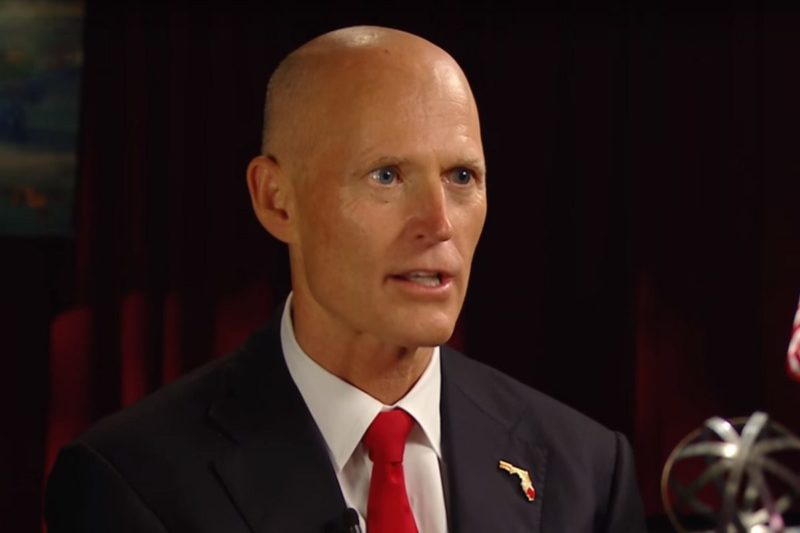Florida GOP Passes ‘Reckless’ Anti-Choice Omnibus Bill
At least one Republican who voted in favor of the measure said she is concerned that the bill's language could become an issue in the courts.

Florida’s Republican-dominated legislature on Wednesday passed an omnibus anti-choice bill that would include targeted regulation of abortion providers.
HB 1411, sponsored by Rep. Colleen Burton (R-Lakeland), would create restrictions on abortion clinics, ban organizations that provide abortion care from receiving state Medicaid funds, and redefine the trimesters of pregnancy.
The bill was passed last Wednesday by the house 76 to 40, mostly along partisan lines, with two Democrats voting with the Republican majority in favor of HB 1411. Six Republicans voted with the Democratic minority against the bill.
The state senate also voted for final passage on Wednesday in a 25-15 vote, with one Republican joining the Democratic minority in opposing the omnibus bill.
State Sen. Eleanor Sobel (D-Hollywood) said during floor debate that she was opposed to the bill because it is intended to restrict access to reproductive health care, reported the News Service of Florida.
“This decision [to have an abortion] is personal for a woman, her family and her faith … a truly personal decision,” Sobel said. “Many women and men believe that the government has no right to interfere with this personal decision.”
While Republicans pushing abortion restrictions have often cited health and safety as the primary intention of anti-choice measures, state Sen. Alan Hays (R-Umatilla) said during the floor debate that he supported the bill because Floridians needed “to do everything that we can to not sanction murder,” reported the News Service of Florida.
The bill was amended in the house to include language stating that the goal of the bill is “to protect all human life by regulating the termination of pregnancies through the exercise of their right to self-government.”
State Sen. Kelli Stargel (R-Lakeland), who voted for the bill, told the Tampa Bay Times that the bill’s language could become an issue in the courts.
“Those clauses gave me concern that it would make it as though our intent was to close down all abortion clinics in the state,” Stargel said. “That was not the intent of this bill.”
Laura Goodhue, executive director of Florida Alliance of Planned Parenthood Affiliates, said in a statement that the “reckless legislation” would leave thousands without access to birth control, cancer screenings, and other preventive health care, and could restrict access to legal abortion across the state.
Physicians who perform abortions at the clinic would be required to have admitting privileges at a hospital within “reasonable proximity” to the clinic. A similar admitting privileges requirement in Texas’ omnibus anti-abortion law is at the center of the case recently heard by the U.S. Supreme Court.
The bill would require annual health department inspections of licensed abortion clinics. State officials, during each inspection, must review at least half of patient records generated since a clinic’s last inspection. The bill also mandates a prompt investigation of “credible allegations” of abortions being performed at unlicensed clinics.
“This bill says we’re going to treat abortion clinics the same way that we treat other similarly situated clinics,” state Sen. Stargel said during the floor debate, reported the Miami Herald.
The anti-choice law has a provision banning organizations that provide abortion services from participating in the state Medicaid program. Florida’s reproductive health-care clinics that provide HIV and STI testing, cancer screenings, and other types of preventive care receive about $200,000 annually through Medicaid, according to the Miami Herald.
“The idea that my taxpayer dollars, and my family’s taxpayer dollars and the taxpayer dollars of individuals who feel like we do about this issue … the idea that those taxpayer dollars would go to an organization that performs abortions, that is simply intolerable,” state Sen. Rob Bradley (R-Fleming Island) said during the floor debate, reported the News Service of Florida.
Republican Gov. Rick Scott’s administration claimed last year that three clinics were performing illegal abortions. The regulators alleged that the clinics provided abortion procedures that were past the first trimester of pregnancy, beyond the point at which the clinics were licensed to provide abortion care. The administration backed down from those charges.
HB 1411 would effectively redefine the first trimester as ending in the 11th week of pregnancy, not the 14th week, as is standard medical practice.
Michelle Richardson, director of public policy at the ACLU of Florida, said in a statement that the bill is a politically motivated attack on reproductive rights.
“The burdens placed on health care providers will be impossible for many clinics to meet, and will shutter clinics that provide a variety of health services, making it less and less possible for a Florida woman—especially if she is poor or works full-time—to access the health care she needs,” Richardson said.
State Sen. Nancy Detert (R-Venice), one of the Republicans who joined Democrats in opposing the legislation, said that state lawmakers should stop “nibbling around the edges” of abortion access, and compared the campaign against abortion to campaigns against smoking.
“Just because you took everybody’s ash trays away doesn’t mean they quit smoking,” Detert said, reported the Miami Herald. “Just because we make it more difficult for people to get an abortion or more expensive doesn’t mean that those people who want an abortion aren’t going to try to get one. They’ve done it historically for hundreds of years.”
Scott has yet to indicate whether he will sign the legislation. A spokesperson for the governor told the Associated Press that he will review the anti-choice legislation.
Scott must sign or veto legislation within 15 days after it is delivered to the governor’s office or it becomes law without his signature. The bill was delivered to the governor’s office on March 11.

